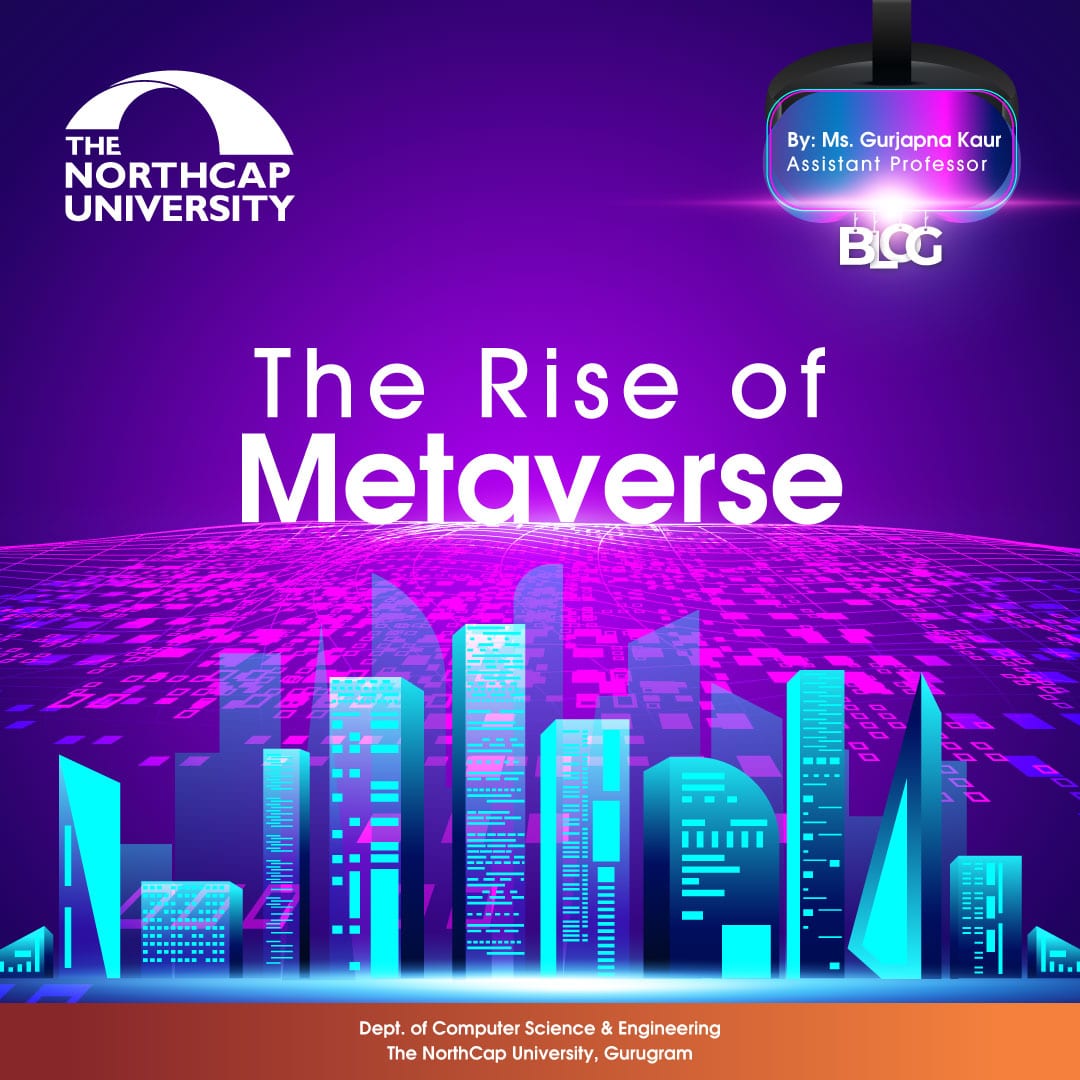The Rise of Metaverse

In the realm of technology, a new buzzword is taking center stage – the Metaverse. Coined by Neal Stephenson, in his 1992 science fiction novel “Snow Crash”, the Metaverse represents a virtual universe where users can interact with each other and digital environments in real-time. What was once a futuristic concept is now becoming a tangible reality with significant implications for gaming, entertainment, education, and beyond. The Metaverse has garnered significant attention acrossvarious industries, and one sector where its potential is truly transformative is gaming. In this case study, we will explore a notable example that showcases the rise of the Metaverse in the gaming industry and its impact on creating immersive and interactive experiences for players worldwide.
In this blog post, we will delve into the rise of the Metaverse, its potential applications, and the transformative impact it could have on our daily lives.
1. Defining the Metaverse:
Understanding the concept and origins of the Metaverse.
Differentiating between virtual reality (VR), augmented reality (AR), and the Metaverse.
The underlying technologies driving the Metaverse include blockchain, virtual reality
headsets, and social networking platforms.
2. Gaming and Entertainment:
Exploring how the Metaverse is reshaping the gaming industry.
Immersive multiplayer experiences and virtual economies within the Metaverse.
Virtual concerts, live events, and the fusion of real-world and digital entertainment.
3. Beyond Gaming: Metaverse in Real-World Applications:
Education and remote learning in the Metaverse.
Virtual conferences, meetings, and collaboration spaces.
Architecture, design, and real estate in the Metaverse.
4. Social Interactions and Digital Identities:
The role of social networking platforms in building the Metaverse.
Customizable avatars and personal digital identities.
Opportunities and challenges in creating inclusive and diverse virtual communities.
5. Economic Opportunities and Challenges:
The rise of digital assets and non-fungible tokens (NFTs) in the Metaverse.
Entrepreneurship and business opportunities within the Metaverse.
Addressing concerns of economic inequality and virtual wealth disparity.
6. Ethical Considerations and the Future of the Metaverse:
Privacy and data security in the Metaverse.
Regulation and governance in a decentralized virtual world.
Ensuring equitable access to the Metaverse and mitigating social divides.
7. Virtual Economies and Digital Ownership:
Exploring the concept of virtual economies within the Metaverse and the emergence of digital assets.
The role of blockchain technology and cryptocurrencies in facilitating secure transactions and ownership.
The potential for individuals to monetise their creations and skills within the Metaverse creates new economic opportunities.
8. Healthcare and Wellness in the Metaverse:
Examining how the Metaverse can be utilised for telemedicine, remote healthcare monitoring, and therapeutic applications.
Virtual fitness and wellness experiences, including exercise programs and mindfulness practices within the Metaverse.
The potential benefits and challenges of integrating healthcare services into a virtual environment.
9. Environmental Impact and Sustainability:
Discussing the ecological implications of the Metaverse, including the energy consumption of
data centres supporting virtual worlds.
Exploring ways to promote sustainability within the Metaverse, such as renewable energy
sources for powering virtual environments and carbon offset initiatives.
Addressing the balance between the virtual and physical worlds to minimise negative environmental effects.
10. Cultural Preservation and Heritage in the Metaverse:
The potential for the Metaverse to preserve and showcase cultural heritage and historical artifacts digitally.
Exploring virtual museums, art galleries, and exhibitions that allow users to experience and appreciate art and history in new ways.
Ensuring cultural sensitivity and authenticity in the representation of diverse cultures within the Metaverse.
11. Collaborative Problem-Solving and Innovation:
Highlighting the Metaverse 's potential for global collaboration and problem-solving, bringing
together with individuals from different backgrounds and expertise.
Examining how the Metaverse can facilitate innovation by enabling rapid prototyping, virtual testing, and collective brainstorming.
The implications for scientific research, engineering, and other fields that can benefit from collaborative virtual environments.
12. Impact on Physical Spaces and Urban Planning:
Discussing how the Metaverse could influence physical spaces and urban planning, considering the shift towards remote work and virtual interactions.
The potential for virtual cities and architecture within the Metaverse, enabling immersive and interactive urban experiences.
Balancing the advantages of virtual environments with the importance of physical connectivity and community engagement.
Case Study: Decentraland – Building a Virtual Universe
Overview:
Decentraland, a blockchain-based virtual reality platform, is an exemplary case that demonstrates the power of the Metaverse in gaming. Launched in 2017, Decentraland allows users to create, explore, and monetise their virtual experiences within a decentralised virtual world. The platform operates on the Ethereum blockchain, leveraging non-fungible tokens (NFTs) to facilitate ownership and trade of digital assets.
Key Features and Impact:
1. User-Created Content and Ownership:
Decentraland empowers users to build and own virtual land and structures, providing them
with the creative freedom to design unique and personalised experiences.
Users can create and trade virtual assets, including art, fashion, and virtual real estate, fostering a thriving virtual economy within the Metaverse.
2. Immersive Social Interactions:
Decentraland facilitates real-time social interactions through avatars, enabling users to communicate, collaborate, and engage in shared experiences with other players.
Virtual events, conferences, and concerts are organised within Decentraland, enabling participants to attend and enjoy immersive virtual gatherings.
3. Virtual Marketplaces and Economy:
The Metaverse’s virtual economy thrives through the buying, selling, and trading of virtual assets using the native cryptocurrency, MANA.
Users can purchase virtual land, create unique experiences on their properties, and monetise them by attracting visitors or hosting events.
4. Cultural and Artistic Showcases:
Decentraland serves as a canvas for artists to exhibit their digital art collections within virtual galleries and museums, transcending geographical limitations.
Virtual art auctions and exhibitions offer a platform for artists to reach a global audience, creating new opportunities for recognition and revenue.
5. Entrepreneurship and Business Opportunities:
Decentraland provides a fertile ground for entrepreneurs and businesses to establish virtual storefronts, gaming experiences, and services within the Metaverse.
From virtual fashion brands to virtual casinos and gaming experiences, entrepreneurs can capitalise on the Metaverse’s growing user base and economic ecosystem.
Conclusion:
Decentraland’s success story showcases the immense potential of the Metaverse in gaming. It demonstrates how users can shape their virtual experiences, engage in vibrant social interactions, and participate in a thriving digital economy. Decentraland’s decentralised and user-driven approach highlights the transformative power of the Metaverse, blurring the lines between the physical and virtual worlds. The case of Decentraland illustrates that the Metaverse is not just a futuristic concept but a tangible reality reshaping the gaming industry. As the Metaverse continues to evolve, it offers unprecedented opportunities for gamers, creators, artists, entrepreneurs, and businesses to forge new paths in the realm of digital experiences.
The Metaverse represents a new frontier of digital experiences, blurring the lines between physical and virtual realities. With its potential to revolutionise gaming, entertainment, education, and various other industries, the Metaverse is poised to transform the way we interact, work, and socialise. However, as we embark on this journey, it is crucial to address the ethical, economic, and societal implications to ensure an inclusive, secure, and beneficial metaverse for all. The future of the Metaverse holds immense promise, and it is up to us to shape it responsibly.
Author

Gurjapna Anand
Assistant Professor, Department of CSE
The NorthCap University, Gurugram
